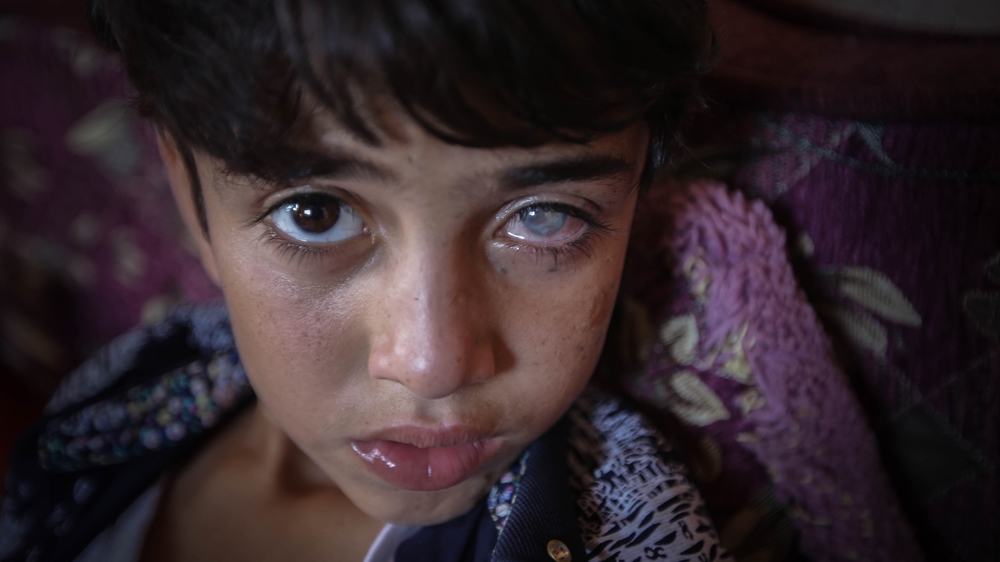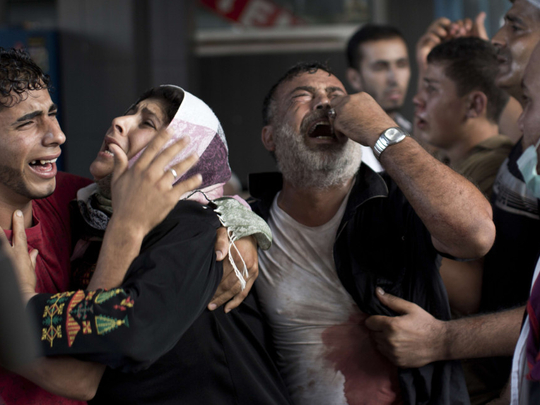
Trauma for Gaza’s children will last years, if not a lifetime
‘I Don’t Want to Live Through This Again’
Humanity & Inclusion
(May 27, 2021) — After eight days of bombings, a 2 a.m. ceasefire took hold in Gaza on May 21. Amal, who works for Humanity & Inclusion in Gaza, took time on Friday May 21, to share her hopes and experiences for the days to come.
Q: What is happening in Gaza right now?
A ceasefire was declared at 2 a.m. Since then, everybody is trying to understand what’s happening. There is no bombing and no more fear. People went to the streets to celebrate the end of the bombing. Everyone in Gaza is just trying to understand what happened and what to expect in the upcoming days.
Q: Have you been able to go outside since the ceasefire?
I’m not sure I am ready to see what’s happening outside yet. My brother went out and he said there are a lot of damages to the streets and the nearby houses. I’m not sure I can do that yet. I’m just not ready. This is not the first experience for us, and I know the feeling when you go outside, see the damage, and remember the people who were alive just a week ago.
My spirit it not ready yet to see all this damage and loss.
Many who needed to evacuate their houses are going back to see the damages in hopes of returning. We had to evacuate our house. My cousins lost their apartments, my sister and her husband, too. When you have to leave your house, and decide what are the most important things to take with you, knowing that this is may be the last time that you see your room, your things, your street, this is a horrible experience. I feel exactly like everyone who had to experience this.

Q: Now that the bombing has ended, what are the current needs?
We have to start over from scratch, starting by rebuilding our spirits through psychological support. I have three nieces. The older one is 11 years old, and last night she jumped from her bed and ran around the house during her sleep. The other one is 9 years old, and she is talking in her sleep about the bombing. The entire community are victims now.
People are injured and need to lead new lives with their injuries. We may have finished the war with death, but now we have our war with life after this.
All of us are tired and need support, but this feeling will help us to provide more support to people in more need in our community. This will give us strength to continue to support them.
Q: Can you explain the work you do with Humanity & Inclusion and its contributions to the current needs?
I work as an Information Management Officer. I started this job the beginning of this year. Before this, I was working in the inclusive education project. I deal with numbers and data, so through my job I can show the impact of this violence on our beneficiaries. By producing numbers and fact sheets and so on, I can present what happened and what the people need. Through my job, I can represent what the needs are and how we can help our beneficiaries.
Q: What are you expecting in the coming days?
I feel more hopeful this time. I feel some solidarity from people around the world. I hope that this ceasefire will stay, but it isn’t so clear what is going to happen. So, I hope that this will stay and that we’ll never have to this experience again.
I have lived through four official wars and more conflicts than I can count. I don’t want to live through this again.
I’m very hopeful that this will work out and we’ll find a way to live our lives and support people in need without having to think about this kind of devastation anymore.
Helping Injured Civilians in Gaza

Ceasefire enables local teams to offer care to more than 500 Gazans
(May 27, 2021) — As you may have gathered from Amal’s story, Humanity & Inclusion teams are providing physical rehabilitation to at least 500 Palestinian civilians with injuries or disabilities. Staff, working in Gaza since 1996, are offering psychological support, and distributing assistive devices such as wheelchairs, walkers and crutches.
Twelve days after the most recent escalation of violence in Gaza, the parties involved have announced a ceasefire.
This long-awaited break comes after nearly eight days of constant bombings resulted in 242 lives lost between Gaza and Israel, including 67 children and 43 women. More than 1,700 people are injured.
“We’ve been waiting for a ceasefire,” says Laurent Palustran, Humanity & Inclusion’s country manager for the region. “We can now start responding to humanitarian needs with more ease and be able to intensify the distribution of a lot more aid than what we’ve done so far.”
According to a recent report by the UNWRA, approximately 91,000 people have been internally displaced, over 66,000 of whom have sought refuge in 58 UNWRA schools opened as emergency shelters. Humanity & Inclusion teams have conducted needs assessments of those displaced people to determine next steps.
“We’re starting to get clearer data thanks to these evaluations,” Palustran explains. “We have identified over 500 people in these shelters that have disabilities and are in need.”
Reham Shaheen, Humanity & Inclusion’s Rehabilitation Task Force Coordinator in Gaza, explains the needs of the vulnerable populations the organization serves in areas of conflict.
“Psychosocial support is one of the greatest needs,” Shaheen says. “Many will lose a limb or an organ and will have psychological needs afterwards. People really need mental health and counseling to cope with the current situation. Then there is great need for multidisciplinary rehabilitation services, like physical therapy and wound dressing sessions to prevent disabilities after injury.
“Usually the needs of injured people change after a few weeks. There is either deterioration or improvement in their condition, so there is dire need for assistive devices and rehabilitation support as well.”
Humanity & Inclusion is prepared to distribute mobility aids such as crutches, walkers and wheelchairs, along with Infection Prevention and Control kits to keep wounds clean and prevent infection that could lead to long-term ailments.
The Covid-19 pandemic has not let up in Gaza, with Johns Hopkins reporting a total of 304,532 confirmed cases since the start of the pandemic, and 3,448 deaths between Gaza and the West Bank.
“This escalation occurred while we’re being hit with a second wave of Covid-19,” Shaheen explains. “We have two emergencies, so there is a need for hygiene kits. People need to have clean environments to be able to avoid illness, and in terms of injuries, to keep their wounds clean to avoid any infections.”
Related Campaigns
A decade of explosive violence harm: Did you know that 262,413 civilians have been injured or killed by explosive weapons worldwide over the last 10 years? The latest report from our friends at Action on Armed Violence is one you won’t want to miss.
Take a stand against landmines: A huge thank you to the thousands of people who have joined us in calling on the US to ban landmines and join the 1997 Ottawa Treaty. If you haven’t already, please take a few moments to add your name to the petition. Will you share the petition with three friends?
We are so grateful to our donors for investing in this work—and so much more—to ensure the people we serve feel valued and supported. Warmest regards, Humanity & Inclusion.